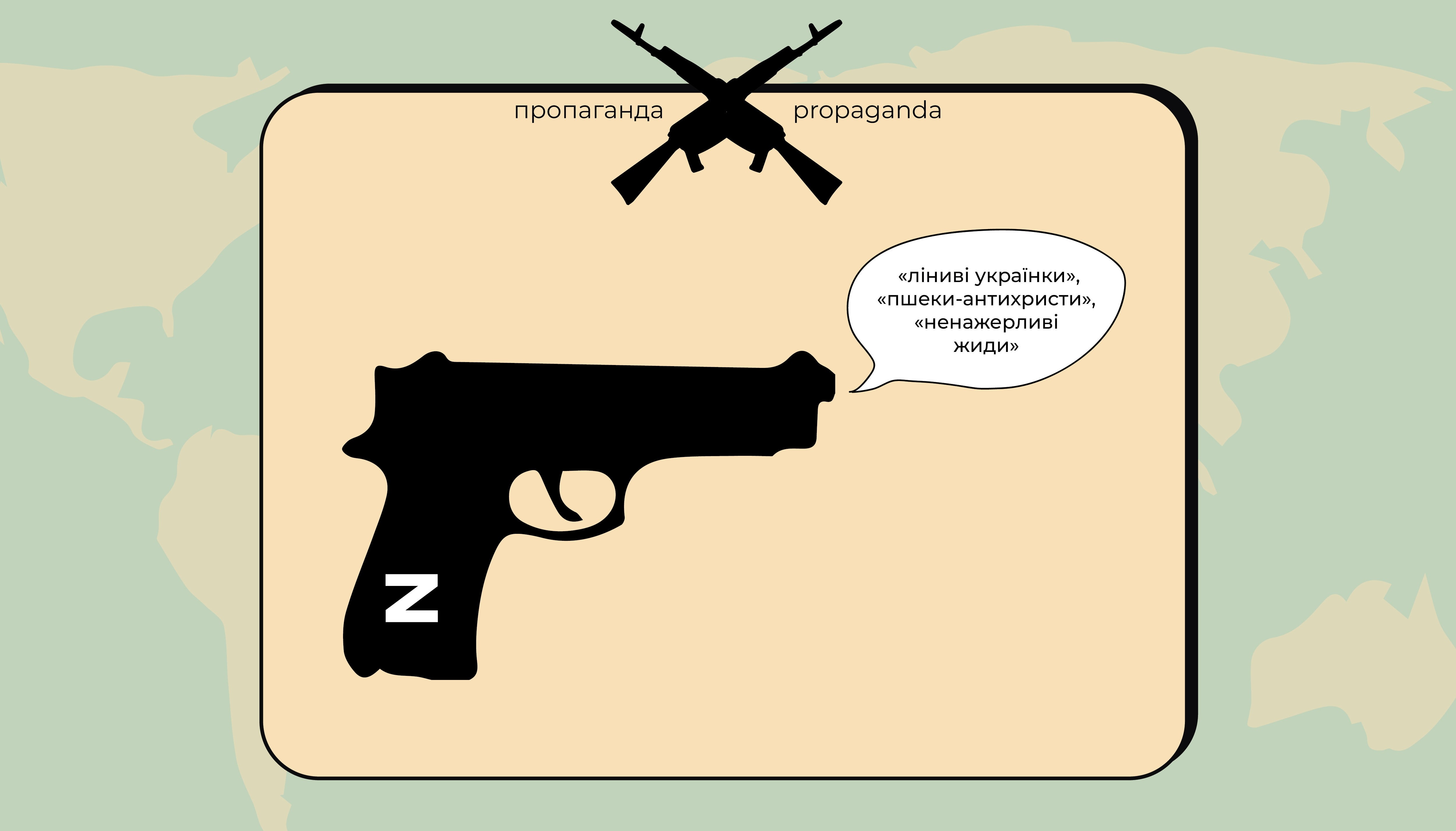Russian propaganda weaponizes representatives from various communities, including ethnic and religious, aiming to tarnish their reputations in the pursuit of its political objectives.
“Anti-Christian Poles,” “dimwitted Hungarians,” and “greedy Jews” — such expressions merely enhance the texts through which propaganda endeavors to mold, mildly put, a negative perception towards a certain community or so-called minority. Propagandists exploit stereotypes entrenched in society to disseminate their desired messages while simultaneously crafting new ones. For instance, Jews are painted as the instigators of the Russian-Ukrainian war, thus fostering societal division. In this text, we elucidate why Russia relies on this so-called “narrow” disinformation, the concept of weaponization, and its implications for us.
Within our context, weaponization is a phenomenon where information is manipulated as a weapon to assault the information sovereignty of another country. The Russian propaganda machine persistently employs this technique to circulate disinformation narratives favorable to Russia and attain political ends. Victims of weaponization can be states, such as Ukraine, which Russia has derogatorily labeled a so-called failed state for over eight years, or individual groups of people, in other words, communities. For instance, this is how Russia has manipulated information about Ukrainian refugees, women, or children to disseminate the messages it desires to European and other societies.
Specifically, propagandists have fabricated a portrayal of Ukrainian women as “untrustworthy,” “inept,” and “lazy,” who, escaping the war, can only resort to sex work and sending “nude photos” to subsist. In doing so, propagandists disrespect the dignity of Ukrainian women and dismiss their accomplishments, suggesting that Ukrainian women have no other means of self-realization.
Russian propagandists also weaponize everyday topics. For instance, by labeling Ukrainian refugees as Nazis (connoting extreme xenophobes) or alleging they are unwilling to work for their upkeep, preferring to live off European taxpayers. Propaganda also attempts to depict Ukrainians as criminals who are purportedly wreaking havoc on Europe and causing its economy to collapse, among other things.
Research indicates that Russia sits atop the global leaderboard in the use of online disinformation for influence campaigns, accounting for 62% of such intrusions into the domestic affairs of other nations. Various studies also illustrate how Russian disinformation narratives mutate, shift and rapidly adjust to the changing news landscape. According to a study by the European Policy Center, significant global events, such as the so-called migration crises, act as a catalyst for the dissemination of disinformation, offering a stage to incite hatred, instill fear, and reshape the tone and content of the public discourse.
To exemplify the adaptability of disinformation to news and its ability to shape political discourse, analysts from the European Policy Center point to recent developments in Afghanistan and Belarus. Specifically, shortly after the Taliban seized power in Afghanistan, disinformation emerged claiming that hundreds of thousands of Afghans were en route to Europe. The report falsely suggested that only Afghan men fled the country and their lives were not at risk. Such fabricated news stoked fear of an impending “invasion” of Afghans in Western society. Disinformation narratives were also propagated in the wake of news about the migrant situation on the borders of Latvia, Lithuania, and Poland. Propaganda swiftly reacted to the wave of Ukrainian refugees compelled to leave their country due to Russian aggression. Detector Media documented the first messages about “bad” Ukrainian refugees in early March 2022, a week following the onset of full-scale war.
Russia, in its relentless pursuit to tarnish Ukraine’s reputation, turn the international community against it, and destabilize the nation’s internal affairs, doesn’t spare any group, including Ukrainian women, refugees, or children. Its propaganda machine capitalizes on the lives of diverse communities within Ukraine and beyond, including ethnic groups like Hungarians, Poles, and Jews, as well as religious communities such as Orthodox Christians and Catholics. Russia’s aim is to fabricate negative personas for these communities and stoke animosity between them and the Ukrainians.
Such “narrow”, specialized disinformation campaigns are effective because they are tailored to specific audiences and capitalize on pre-existing societal stereotypes. For instance, gender-based disinformation reflects prejudiced and stereotypical attitudes toward women that are amplified amid the full-scale war with Russia. Ukrainian women grapple with new challenges: ensuring their own and their children’s safety by seeking refuge abroad, enlisting in the army to defend their homeland, and searching for employment in new environments. Russian propaganda adeptly identifies these escalating issues and strives to exacerbate them into deep-seated fractures within democratic societies. It breeds discord between Ukrainian women who have fled the country and those who have stayed; it discredits refugee women from Ukraine in the eyes of foreigners; it attempts to normalize sexual crimes committed by Russians; and broadly undermines Ukraine’s pursuit of gender equality, a cornerstone for democratic development.
A similar methodology is employed with representatives of ethnic communities who, thanks to the efforts of Russian propaganda, are portrayed as invaders, war instigators, or ignoramuses. The same applies to representatives of other so-called vulnerable groups.
The Detector Media Analytical Center team is launching a new series of studies on Russian disinformation, aiming to unravel how and why Russia exploits various communities in its propaganda. In the initial phase of the research, the team scrutinized over 50,000 posts in the Ukrainian segment of Facebook, YouTube, Telegram, and Twitter about diverse ethnic communities residing in Ukraine. A few examples from the data sets are provided below to illustrate how this weaponization operates in practice.
The study unearthed messages alleging that Jews initiated the war in Ukraine or suggesting that Poles are devalued by Ukraine despite their consistent support. A post read, “To conform with EU accession norms, Kyiv has escalated nationalism to unprecedented levels. Extreme Russophobia has led to a bill on the protection of ethnic minorities, which was designed to demonstrate to Europe that Ukraine is primed for EU membership. However, Poles, Bulgarians, Hungarians, and Romanians have been denied the ability to use their native languages in all societal domains. Poles are not granted the freedom to use their national symbols by the new legislation, despite their active role on the frontlines and Poland’s extensive aid to Ukraine.” Russia aims to stoke conflicts and discredit Ukraine through such messages. They insinuate that Ukrainians are unwilling to respect the uniqueness of other nations, their language, and their culture but are ready to accept assistance from these states.
Some messages also surfaced suggesting that Jews were “leading the Ukrainian people to their demise.” One post from pro-Russian users stated, “The moment of truth for Zelenskyy. The Ukrainian army’s offensive, which everyone anticipates and talks about, may kick off next week. If the offensive doesn’t succeed, Zelenskyy won’t survive the spring, and Ukraine will plunge into a Syrian scenario, where a civil war among armed gangs will continue for several more years. The assertion that ‘a Jewish drug addict is annihilating the Ukrainian people and leading them to their demise’ is gaining traction in Ukraine’s nationalist right-wing circles, where a historical propensity to despise and annihilate the ‘Zhydy’ is prevalent.”
Conversely, there were messages purporting that “Jews are promising Ukrainians a life free from Muscovites.” This notion is supposedly why Ukrainians back Zelenskyy and his perceived “aggressive” policy. Some posts also suggested that “the Jews have instigated a feud between Ukrainians and Russians,” with comments such as “The Jews have stirred up strife, and the fools are rejoicing. They are exclaiming, advocating for the elimination of Muscovites, inciting murder.”
Numerous posts sought to tarnish specific nations that allegedly harbor plans for Ukraine. For instance, the Poles, or as they were derogatorily referred to, the “Psheks,” are supposedly intent on claiming the Ukrainian region of Galicia, while Hungarians and Czechs are targeting Zakarpattia. This narrative of neighboring states’ intentions to annex portions of Ukraine’s territory is a recurrent theme in Russian propaganda. In this context, Russians not only underscore the purportedly nefarious intentions of these states but also exploit the variance in cultural values to create a negative portrayal of Poles, Hungarians, or Romanians. Statements like “The Poles need Ukraine. Transcarpathian Ukraine will fall to the Magyars and Czechs. Galicia will be under Poland. Eastern and Central Ukraine will be under Russia. Bukovyna will be under Romania” were common. Hungarians were also negatively stereotyped with assertions about their supposedly poor intellectual capacities. According to these posts, Hungarians residing in Ukraine are incapable of learning Ukrainian, which implies “they are unintelligent.”
Posts also contained statements such as “the Poles are not prepared to fight” and “the Poles are demolishing Orthodox churches in the Donbas.” One post stated that “Polish mercenaries fighting in the Ukrainian army are a special kind of scoundrels. They not only instigate a war that isn’t theirs but also intentionally destroy Orthodox churches in the Donbas — they are heathens!” Through these narratives, the Russian propaganda machine aims to attribute negative characteristics to the Poles, discredit them, and rally its audience against them.
In these messages, Russian propaganda frequently employs an array of slurs, referring to Jews as “Zhydy,” Poles as “Psheks,” and so forth. This tactic enables propagandists to instill a biased stance toward community members very quickly.
By incorporating words that have become commonplace as slurs, propaganda seeks to tarnish not only members of a specific group but also certain organizations, adversaries, and so forth. For instance, using the term “Zhydy” might be a reference to their supposed greed. A similar situation occurs with terminology related to the LGBTQ+ community, with propagandists using lexemes like “Gayrope,” “Eurogays,” “UN Gay Assembly,” “Council of Europe Gay Secretary,” “Khokhlopediks,” “Patriarch Pedril,” and “Gaymak.” These coarse or distorted word variants, known as portmanteaus, are used as complete substitutes for actual geographical names, roles, institutions, etc. These phrases are employed to belittle or mock opponents.
Disinformation targeting a specific community is perilous not only for the public image of its members but also for its potential to destabilize inter-community relations within a country. For instance, as the socio-economic ramifications of the war in Ukraine, such as inflated energy prices, begin to be felt in EU countries, prejudice against refugees could escalate. In essence, false narratives about refugees serve to fragment society, engendering divisions among various groups in opposition to each other. The same mechanism applies to Jews or Poles, whom Russia accuses of inciting war while justifying itself. Such disinformation could also potentially undermine Ukraine’s reputation among its allies and sour relations with them. For instance, it could set Poles against Ukrainians.
Stay tuned for full reports on the way Russian propaganda leverages ethnic communities in its disinformation campaigns, soon to be published on Detector Media. In the meantime, we invite you to delve into our research on disinformation related to the LGBTIQ+ community and gender issues.



